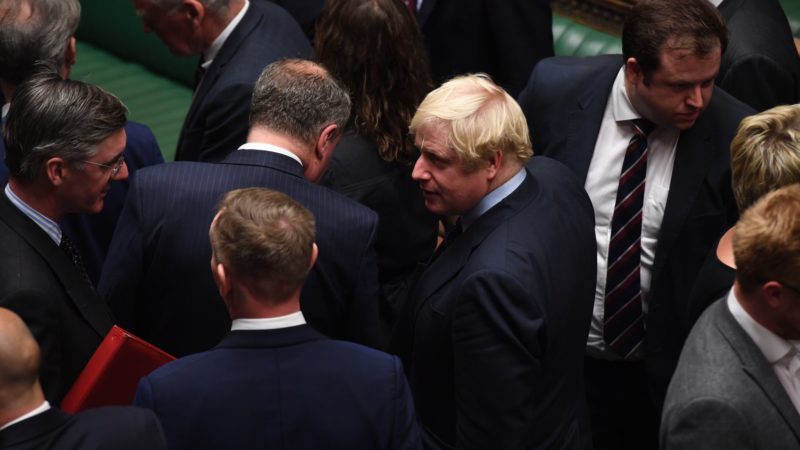
Over the weekend, former Conservative Chancellor Philip Hammond wrote that Boris Johnson “is backed by speculators who have bet billions on a hard Brexit – and there is only one outcome that works for them: a crash-out no-deal Brexit that sends the currency tumbling”.
Hammond’s comments follow evidence of a rise in short positions taken against sterling which, in turn, could be evidence of bets against a no-deal Brexit. A ‘short position’ is a bet on currency or stocks that the prices will go down. It involves a share being borrowed, sold immediately at market price with an agreement to repurchase later, then repurchased (at a lower price) and returned to the owner. Money is made from shorting when the price falls; when prices rise, money is lost. The film The Big Short explains how this led to the 2008 financial crash.
What Hammond’s claims highlight is that a number of Boris Johnson donors who back a no-deal Brexit are also associated with hedge funds involved in shorting. The Byline Times reported on September 11th a huge spike in the number of short positions being taken ‘on a no deal Brexit’ between January and May, and July when Boris Johnson was elected leader of the Conservative Party. The report notes that two-thirds of Boris Johnson’s donors between May and July were from hedge funds. Although the Byline Times has = been found to have misread some data overestimating the spike in shorting, it is clear that there has been a rise in short positions taken against sterling.
In the week to August, there were approximately twice as many contracts betting against sterling as before the EU referendum in June 2016. Further, leveraged funds increased net short positions against sterling to $7.83 billion in the week to August 6th. Later in August, short bets against sterling rose to their highest in more than two years.
This has been matched by the fall in the value of sterling, which, when not being manipulated, tends to reflect the health (or not) of the economy. On average in August compared with July, the pound fell by 2.5% against the dollar, following a fall of 1.7% between May and June. The pound fell sharply against the dollar following the EU referendum, from $1.48 on 23 June 2016 to $1.14 in June 2017 – a 31-year low. In 2018, the value of the pound against the dollar reached as high as $1.43 in mid-April (the highest since the EU referendum), though has fallen since, remaining between $1.20 and $1.22 since mid-August 2019.
Sterling was down 1.7% against the Euro on average in August compared to July. On 4th September 2019, the Euro was valued at €1.11 per £1. This compares with a daily all-time low of €1.02 (on 30 December 2008), and a launch rate of €1.48 on 31st December 1998. The impact on businesses trading with the EU is already being felt, as well as with holidaymakers.
Many of those involved in this shorting are friends of the Prime Ministers – and donors. This year, Boris Johnson and the Tories have received £726,000 from individuals, a number involved with hedge funds, who back no deal:
- Lord Bamford has donated £121,000 to Boris Johnson. The JCB tycoon gave the Conservatives £250,000 in April. This follows £2.483m donated to the Conservative Party in 2018.
- Boris Johnson received £25,000 from hedge fund boss Jonathan Wood in May – ten days after Wood had given the Brexit Party £75,000.
- Christopher Harborne followed up his £200,000 donation to the Brexit Party in April by giving the Tories £20,000 in June.
- In June, the Conservatives took £200,000 from recruitment boss Robert Walters. In January, Walters told a newspaper: “We should just go to WTO and be done with it.”
- Crispin Odey gave Boris Johnson £10,000 in June – he has already made hundreds of millions of pounds following the Brexit vote, and his firm maintains ‘short’ positions on many British firms.
- Investment manager and senior Vote Leave staffer Jon Moynihan gave £100,000 to Boris Johnson in June 2019.
- Tory peer and Next boss Lord Wolfson has donated £550,000 to the Conservatives and was a prominent member of the Leave Campaign. He has said no deal would reduce his firm’s costs by £25m.
The Financial Conduct Authority requires that a short is declared to the FCA where, if a private share, the net short position is at least 0.2% of the company’s share capital – and there must be a further declaration at each 0.1% increment after that. In the case of public shares, a net short position must be declared if shares reach 0.5% of a company’s share capital, and at every 0.1% after that.
A future Labour government would undertake a 12-month inquiry into the finance sector, including looking at whether hedge funds and short selling are appropriately regulated. We will also introduce a range of other measures, including a review of MPs’ Conflict of Interest Code, which will ensure that MPs do not stand to gain financially, directly or indirectly, from events such as no deal that will have disastrous consequences on our country.




More from LabourList
‘I was wrong on the doorstep in Gorton and Denton. I, and all of us, need to listen properly’
‘Why solidarity with Ukraine still matters’
‘Ukraine is Europe’s frontier – and Labour must stay resolute in its defence’